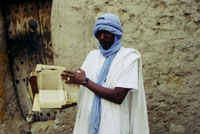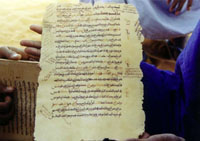What is at stake in Timbuktu?
Tragedy is due to divergence and because of lack of tolerance … Glory to he who creates greatness from difference and makes peace and reconciliation - Timbuktu manuscript entry by El Hadj Oumar Tall (1797 - 1864), a prominent Timbuktu scholar and leader.
A Cultural & Literary African Legacy
 Scholars from the 12th – 19th centuries used the written word extensively to guide leaders of multi-ethnic states spanning vast areas of Africa. Their writings in Arabic, influenced by traditional African thought and Islamic faith, are especially relevant today for their treaties on tolerance and peaceful means to resolve conflicts.
Scholars from the 12th – 19th centuries used the written word extensively to guide leaders of multi-ethnic states spanning vast areas of Africa. Their writings in Arabic, influenced by traditional African thought and Islamic faith, are especially relevant today for their treaties on tolerance and peaceful means to resolve conflicts.
At its height the University of Timbuktu enrolled 25,000 students and spanned many cities, 180 Qur’anic schools, and ambulant camps in the desert. Conserving and reviving this African cultural legacy will dispel myths of an illiterate past and reestablish Timbuktu as an important African Intellectual and commercial center.
Endangered Peoples & Manuscripts
 In and around Timbuktu, Mali, hundreds of thousands of peoples – notably Tamashek (Tuareg), Songhay, Fulani, and Moor - are impoverished due to geo-political factors, recurrent drought and recent civil conflicts. Their cultural heritage is recorded in over 700,000 manuscripts yet they are also endangered due to poor storage conditions and theft.
In and around Timbuktu, Mali, hundreds of thousands of peoples – notably Tamashek (Tuareg), Songhay, Fulani, and Moor - are impoverished due to geo-political factors, recurrent drought and recent civil conflicts. Their cultural heritage is recorded in over 700,000 manuscripts yet they are also endangered due to poor storage conditions and theft.
Those best qualified to retain and revive this great legacy are a diminishing number of traditional scholars who still understand the manuscripts, their context, and contemporary applications.
Key Aspects of Timbuktu's Heritage:
-
Ancient Manuscripts:
Timbuktu is famous for its vast collection of manuscripts, some dating back to the 12th century. These documents cover topics such as science, astronomy, medicine, and Islamic law. Many manuscripts were preserved in private libraries and institutions like the Ahmed Baba Institute. -
Universities and Learning Centers:
Timbuktu was home to prestigious Islamic universities, including the Sankore University. Scholars from all over Africa and the Arab world traveled to Timbuktu to study and teach. -
Architectural Landmarks:
The city is known for its mud-brick architecture, including notable mosques like:- Djingareyber Mosque
- Sankore Mosque
- Sidi Yahya Mosque
These mosques are UNESCO World Heritage Sites and represent the Sudano-Sahelian architectural style.
-
Trade and Commerce:
Timbuktu was a key trading city on the trans-Saharan trade routes, linking West Africa to North Africa and the Mediterranean. Goods like gold, salt, ivory, and slaves passed through the city. -
Cultural Symbolism:
Timbuktu has become a symbol of African knowledge, resilience, and cultural richness. Despite facing invasions and threats over centuries, the city's heritage remains a point of pride for Mali and the broader African continent.
Modern Challenges:
In recent years, Timbuktu’s heritage has faced threats from extremist groups and environmental factors. However, significant efforts have been made to digitize and protect the manuscripts and restore damaged monuments.
- Home page
- History of Timbuktu - A Multicultural African Legacy
- People of Timbukru
- Significance of the Manuscripts
- Condition of Manuscripts
- Scholars of Timbukru
- The library of Timbukru
- The university of Timbukru
- Your Preferred Source for Sculpture Restoration
- Unravel the mysteries of future by lunar cycle calendar
- Carm - Biblical Numerology
- Numerology is a science of numbers
- The science of numbers called Numerology
- Stamps
- Coin Collection
- Bobbin Lace
- Book Collecting
Historical Collectibles